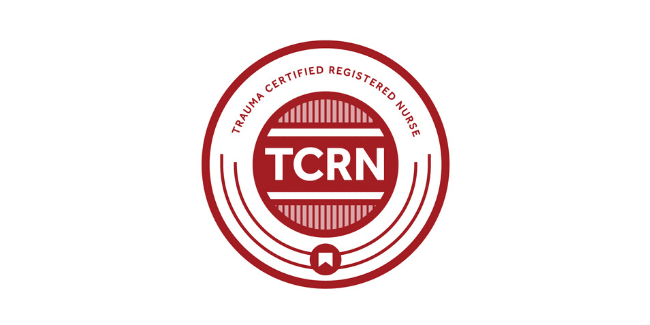On March 25, BCEN was pleased to announce our 2021 Distinguished TCRN Award winner:

Julie Donnelly, MSN, RN, TCRN, Director of Patient Care Services
Thomas Jefferson University Hospital
Philadelphia, PA
We understand you were pretty excited when the TCRN was introduced. Why is that?
When the TCRN came out, it was so exciting to see something just for trauma. We have a core of trauma nurses here who work in the ED but then are specially trained. Our trauma core charter has certification in it, but we had been going with the CEN, which is great. As the trauma manager at the time, I was able to introduce the TCRN and say this is for you, this is for trauma.
We also rolled it out to other trauma-designated areas, which caused more excitement. We had so many nurses interested in the first review course we held here that we had to open more seats! So, all the staff really rallied around the TCRN and wanted it.
What does it mean to be named BCEN’s 2021 Distinguished TCRN?
I am truly honored, and to me, this is a team award. I have seen some of the past winners and the things they have accomplished, and my hat goes off to all of them. This is truly an award for Jefferson and all the trauma nurses here, not just me.
Together we have a lot to be proud of including going from a 38% certification rate to 100% for our ED nurses with at least three years’ experience. And all of our trauma-designated units have certification rates that consistently exceed the average certification rate across all nursing units in the hospital. Plus, all of the benefits that go well beyond these numbers.
Looking at it holistically from when we started introducing the TCRN, even just within the first year or so, it was like: Wow, this is it! This is what trauma nurses need to really get that spark behind them … and they did, they really embraced it.
How does board certified nursing care matter for patients and their families?
Certification matters a lot for patients and their families. They do not always know about it, but it makes a difference. As an RN who is specialty certified, it means you are (a) passionate about your specialty because you spent the time and effort studying and going for the certification, (b) you now have even have more knowledge and training, and (c) you are keeping up on that knowledge and training to maintain the certification. As a result, patients have a very confident nurse at their bedside who has all those skills behind them.
Traumas are the most difficult thing that come through the front door, where protocols and skills matter most because you do not know anything about the patient before they roll through your door. As a TCRN-certified nurse, you now have these skills and the extra confidence level that comes with that, and you can say: Hey, I have a certification in trauma.
Looking back over the past year of the pandemic, what stands out about TCRN-certified nurses?
Right before the pandemic, our institution—an inner city hospital in Philadelphia— was still dealing with a huge increase in volume when another Level I trauma center a mile away closed in 2019. Our penetrating injuries doubled. There was a lot of violence in the city at the time. And then the pandemic hit. It was shocking how quickly everything happened. Our volume went through the roof.
Our nurses drew on all of the expertise they had from being certified because those skills and all the protocols we know and learn from being certified kicked in automatically. I do not know if we would have been able to be as sure of ourselves as we were, because some days it was very challenging to keep your head up. What I do know is our nurses are passionate about trauma. They love working trauma. And when things got even harder during the pandemic, being certified really helped them.
How did you go about supporting TCRN certification at your institution?
You have to take down the barriers and the fears behind it, and then really give nurses the skills they need—because they want this. Once we recognized what the barriers were, mostly around fear and finances, I had such great institutional support, starting with my CNOs. We held TCRN review courses here. We bought the books. We bought apps for their phones or iPads so they could practice the questions. They felt confident when they were going in, and that really did excite them.
We also developed the exam voucher program such that if they took the review course, we paid for the exam. And even if they do not pass the exam the first time, we give them a voucher to take it again within a certain number of days. After that, keeping up with certification is really about offering options here so that they do not have to go outside for all of their CE credits.
When should nurses consider specialty certification?
I think it is our job as leaders to bring certification to bedside nurses from the start of their career and almost making certification a must-have for that next step. Even after we find our niche and our specialty, nurses always have to learn what is new. Certification does that whether or not we consider going for an advanced degree.
Our system has been built with the intent to keep our nurses in the trauma core, but they have to attain a specialty certification. It is a requirement. Because if you are going to be taking care of our trauma patients here, we need to know that you are certified.
And we have the same thing up on our nursing units. After three years of being here at our institution, intermediate or ICU, you need to go for a certification because we want you to continue on your skills and your journey in your career to professionally develop yourself to take care of the patients here.
What do Trauma Program Managers most need to know?
Certification grows your programs. It grows your teamwork. And it really does provide that expertise and specialty care. Your outcomes are going to change because when, for example, you get the traumatically injured OB patient that you get three of a year, and those skills sets kick in automatically because those certified nurses remember that. They know where to grab that in our internal protocol because they have reviewed it because they knew they were sitting for that exam a couple months prior.
It provides confidence. It provides professional development for our staff and our nurses. And that is what we want to build upon. Nurses want to come to work and feel valued and feel like they are making a difference. Giving them these professional development resources lets them see that they really are making a difference and actually saving lives—not to sound corny, but that is what they are doing.

